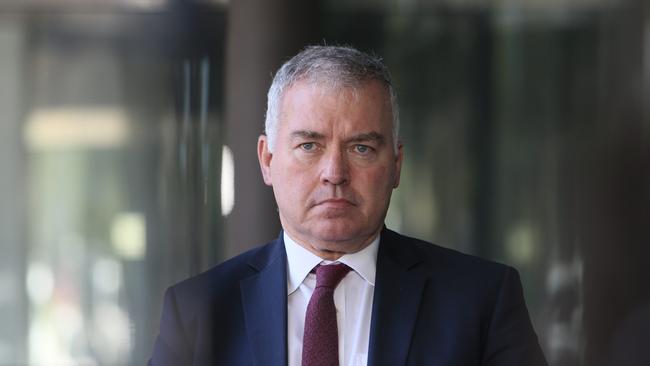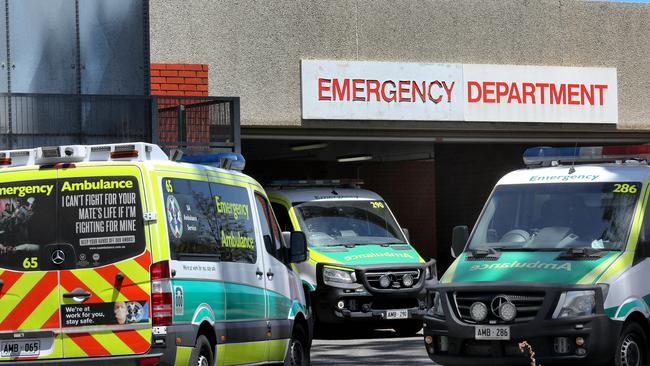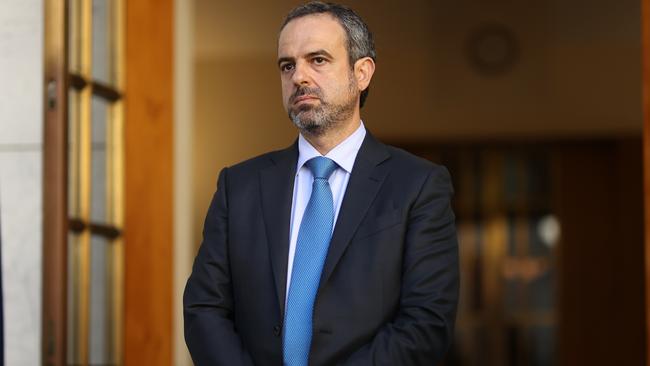Health Minister Stephen Wade apologises to the latest ambo delay victims
A man who died waiting two hours for an ambulance last night is the third patient to die in two days, the union says. Another person waited 11 hours for help overnight.
SA News
Don't miss out on the headlines from SA News. Followed categories will be added to My News.
A man who died while waiting two hours for help is the latest victim of South Australia’s health crisis, the ambulance union says.
The Ambulance Employees Association of SA put out a tweet about 3am Wednesday, and said a man in his 50s “tragically died tonight waiting for an ambulance”.
The man was initially triaged as a priority two case but another call from the scene upgraded the case to a priority one.
Paramedics arrived shortly after the call was upgraded but still outside the priority one response time, and were unable to resuscitate the man.
“Another life lost. Crews, comms staff devastated.”
The SA Ambulance Service (SAAS) said the overnight death would be internally reviewed.
A male in his 50’s has tragically died tonight, waiting for an ambulance.
— Ambulance Employees Association (SA) (@aeasa1981) March 15, 2022
The P2 case waited TWO hours.
Call from scene, upgraded to a P1.
SAAS arrived shortly after (outside P1 timeframe) & were unable to resuscitate.
Another life lost.
Crews, Comms staff devastated.
A SAAS statement said “many factors influence SAAS’s response to a patient” and they would “continue to triage all patients and attend to the most urgent first”.
There were 19 emergency cases with no ambulance to send at about 7.30pm Tuesday in what the ambulance union described was an “unmitigated disaster”.
One patient waited 11 hours for an ambulance last night, union secretary Leah Watkins said.
It comes a day after a 20-year-old was revealed as one of the two people who died waiting for delayed ambulances on Monday evening, according to the union.
Health Minister Stephen Wade apologised to the families of the patients, who both waited more than 45 minutes for help on Monday evening.
The other victim was aged in their 90s.

Speaking at a press conference on Tuesday, Premier Steven Marshall said his thoughts were with the families of two people who died overnight while waiting for ambulances.
“Obviously very sad news this morning to wake up to, with two people passing away last night and my thoughts and condolences are with the family and friends of those two people who have passed,” Mr Marshall said.
“There is a review which is underway at the moment – we will wait for that result – we don’t know whether the delay in getting ambulances there was a contributing factor.
“I don’t see any evidence that there was significant ramping that led to delays,” he said.
“Obviously, SAAS always strives to meet its targets, always strives to meet the needs of the community. We apologise that in this case we didn’t, we’ll look at all the factors to see what … could have led to a better outcome,” Health Minister Stephen Wade said on Tuesday.
The ambulance service’s operational status was set to white on Monday afternoon and evening, meaning there were insufficient resources to meet patient demand and “patient safety was directly impacted”.

Both call-outs were within 5km of the Royal Adelaide Hospital.
Ms Watkins said more deaths would occur if delays continued.
“If people who are calling triple-0 are increasingly experiencing those sorts of delays then it is only a matter of time before it is the next person that passes away waiting for an ambulance,” she said.
‘MAKE HEALTH TOP OF YOUR LIST’: AMA
The Australian Medical Association (AMA) wants South Australians to think about health at the ballot box this Saturday.
State hospitals are performing below the national average according to AMAs 2022 Public Hospital Report Card which said only 50% of Triage Category 3 cases are being seen on time. This includes urgent conditions such as abdominal pain, heavy bleeding, or major fractures.
Median wait times for elective surgery have also increased across the states hospitals to 50 days, 22 days longer than the best-performing state.
AMA President Dr Omar Khorshid said that South Australians are “waiting longer than they should for emergency treatment.”
“We have amazing institutions. But if you can’t get in that front door, or if you’re sitting at home languishing on a elective surgery waiting list, then of course you’re not getting the benefit of that health system and your health continues to deteriorate,” he said.
Dr Khorshid said that he can’t tell South Australians how to vote, but health should be on top of their priority list.

“I’m really pleased to say that health is a critical issue in this state election,” he said.
“The more investment that you see pledged, the better for health care.”
Minister for Health, Stephen Wade said that health is a “priority” for his government and has been for the last 4 years.
“Health is a complex area. It’s doubly complex about in a pandemic environment,” he said.
“The $1.38 billion dollars that we’ve invested in health is the equivalent of two entertainment centre expansions. Showing that we’re willing to invest in health.”
Opposition Leader Peter Malinauskas said the Health Minister and the Liberal government are offering “more of the same” while Labor will create an alternative plan.
“This is the most concerning question that South Australians have to confront at this election,” he said.
“Steven Marshall’s health policies are more of the same, no changes to their plan, no big investments in health, I offer an alternative plan.
“We will not proceed with the basketball stadium. We’ll invest all that money in health with a plan to fix the ramping crisis.”
AMA has established a Clear the Hospital Logjam campaign which aims to secure a new funding agreement to improve the performance and capacity of the states hospitals.
The campaign proposes an increase in the Commonwealth government’s contribution to state health care moving to a 50-50 funding split between the Federal and State governments.
“We’re asking State governments to commit to reinvesting every extra cent of funding freed up by the move to 50-50 back into our hospitals,” said Dr Khorshid.




